
[ad_1]
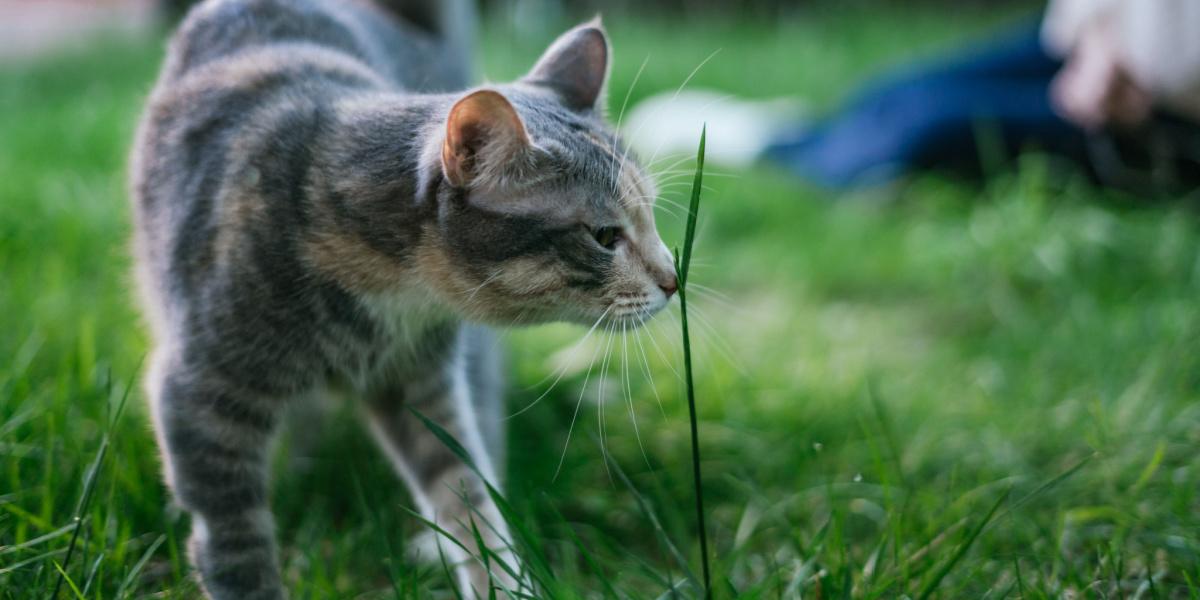
Not like folks, who’re extremely visible creatures, cats expertise the world by means of odor. There are various scents that cats can be drawn to. Likewise, there’s a listing of scents that cats hate.
Home cats use olfactory and chemical info to guage the safety and familiarity of their environment and to decipher whether or not folks, objects, and meals are protected.
Fast Overview
01
Cats can react in another way to the identical scent when uncovered at separate occasions, and completely different cats can reply in another way to the identical odor.
02
Cats use their sense of odor to evaluate the freshness of meals, and to extend their understanding of security and well-being inside the dwelling.
03
Utilizing scented litter can repel your cat from utilizing the litter field, and and robust family chemical compounds would possibly trigger your cat nervousness and misery.
Cats are curious, and instinctive hunters. They will detect odors from miles away. Realizing which scents your cat hates can support their survival and show you how to naturally deter your cat from accessing undesirable places.
Let’s decode which sort of scents most cats hate!
Biology Behind A Cat’s Sense Of Odor
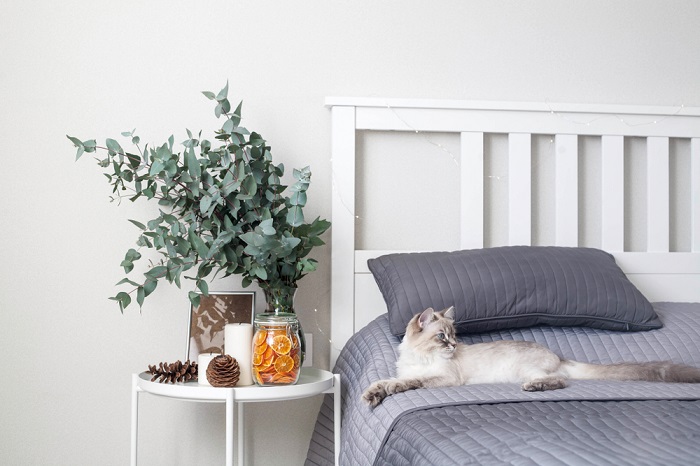
Cats have extraordinarily delicate noses, inflicting them to have pronounced reactions to scents that they don’t like.
Cats have an acute sense of odor. It’s 9 to 16 occasions stronger than a human’s. Cats detect airborne odors utilizing specialised scent receptors situated on the olfactory epithelium inside the nasal crevices within the nostrils of the nostril.
The liner of a cat’s nostril is roughly 20 centimeters squared, in comparison with the liner of a human’s nostril, which is simply 4 centimeters squared. Home cats have about 200 million olfactive receptors in comparison with simply 5 million in people.
The cat has an added scent organ on the roof of its mouth referred to as the vomeronasal organ, generally known as Jacobson’s organ. This organ helps detect pheromones launched by different cats.
Now that you know the way highly effective your cat’s sense of odor is, let’s evaluate which aromas they detest.
Additionally Learn: Do Cats Have A Good Sense Of Odor?
The Completely different Scents & Smells That Cats Hate Most
A cat’s response to a particular scent detected by means of the nostril isn’t static; its significance can change with novel experiences. Cats can react in another way to the identical scent when uncovered at separate occasions, and completely different cats can reply inversely to the identical odor.
Listed below are the preferred scents to which most cats flip their noses.
1. Citrus
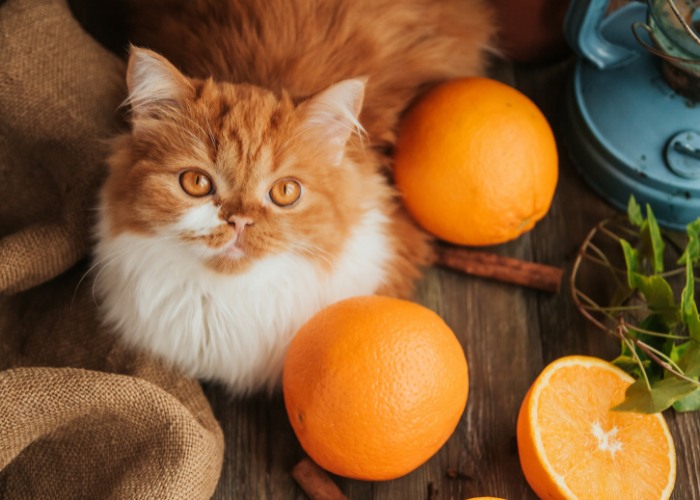
In the event you’ve ever seen your cat turning their nostril away from citrus fruit, it’s as a result of they discover the odor overpowering and unsightly.
Cats and canine strongly dislike citrusy fruit like oranges, lemon, mandarin, lime, and grapefruit. Instinctively many felines discover the citrus scent overpowering and appalling. Ingestion of citrus fruit, pores and skin, or oil could cause vomiting, diarrhea, and potential dermatitis because of toxicity, so most cats be taught to remain away.
Additionally Learn: Can Cats Eat Oranges?
2. Vinegar
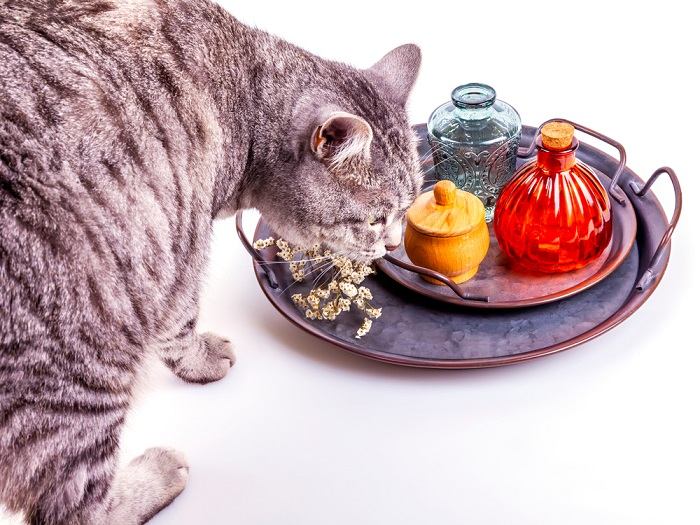
Vinegar is a powerful scent for people, so it is vitally intense to the feline nostril.
Most individuals and cats dislike vinegar because of its acidic odor. Vinegar is just not poisonous for cats and has many cooking and cleansing advantages. Though spraying vinegar can preserve cats away from a specific space for a quick interval, as soon as the scent has dissipated, your cat most certainly will return to the identical spot.
Additionally Learn: What Smells Deter Cats From Peeing?
3. Eucalyptus
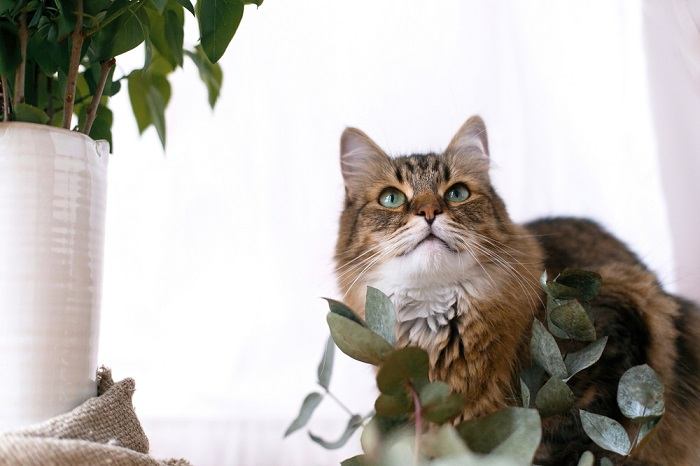
Cats are very turned off by eucalyptus, and for good cause – it could actually trigger drooling, vomiting, and diarrhea for them.
The scent of eucalyptus is one other odor that cats instinctively detest. I’ve but to discover a cat that likes this scent. Ingestion could cause salivation, vomiting, diarrhea, melancholy, and weak point.
4. Bananas
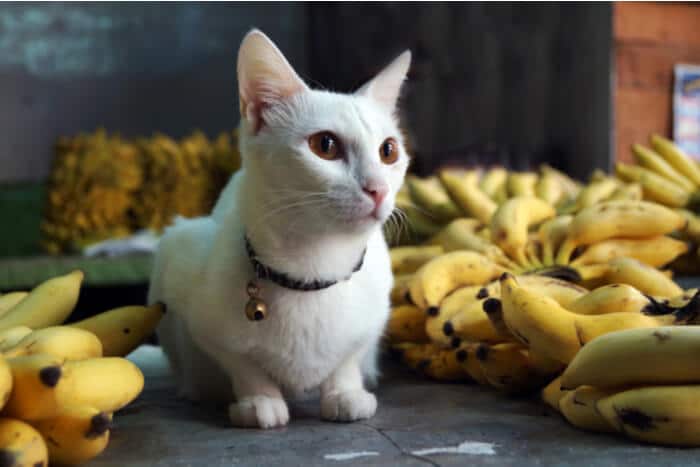
Bananas, notably the peel, can be utilized to discourage cats from poking round the place you don’t need them. They’re non-toxic for cats however nonetheless hated by them.
Bananas usually are not poisonous to pets. Bananas are tasty and filled with vitamins for people, however in contrast to us, many cats appear to dislike their odor. Most probably, cats dislike the odor of the particular banana peel because it comprises chemical compounds like water-acetone and ethyl acetate extracts that cats discover disgusting. Place a number of banana peels to maintain cats from digging pot vegetation or backyard beds.
Additionally Learn: Checklist of Meals Cats Can and Cannot Eat
5. Backyard Mint And Menthol
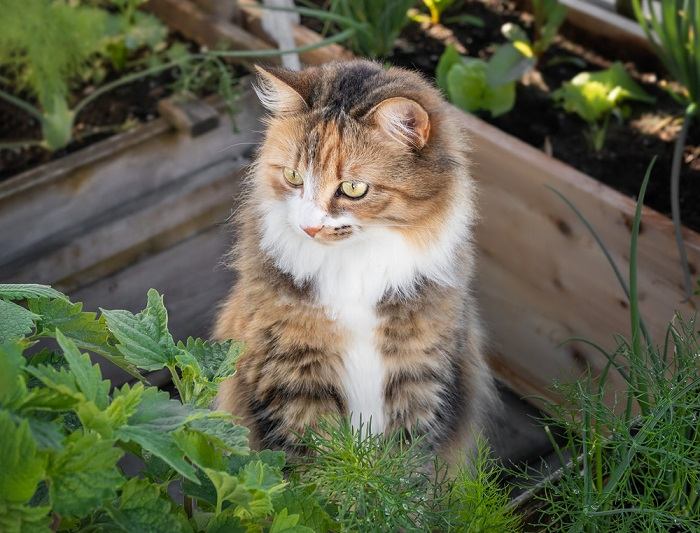
Cats often hate the odor of mint, although it’s in the identical household as catnip, which most cats love.
Many cats dislike the scent of contemporary mint regardless of liking catnip and catmint, that are additionally members of the identical Lamiaceae household. Backyard mint is poisonous to cats and might trigger vomiting and diarrhea if swallowed. Menthol is a uncooked chemical present in peppermint and varied mint vegetation, which is utilized medicinally in cough drugs, nasal inhalers, and ointments.
Most cats discover inhalation of menthol odor unsettling and aggravating. Conversely, tigers, lions, and different massive cats are drawn to menthol. You may be shocked to know that zookeepers rub peppermint oil and completely different scents across the habitats of huge cats as a part of a month-to-month enrichment program.
Additionally Learn: What Does Catnip Do To Cats & Why Cats Like It?
6. Espresso
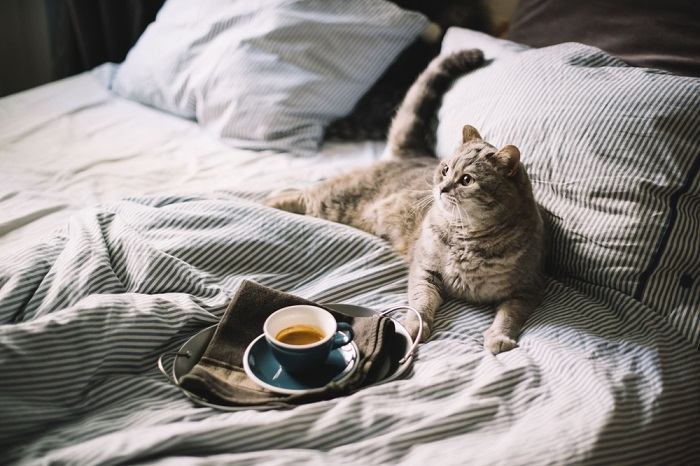
When you might love the scent of your morning cup of joe, cats detest it, as it’s poisonous to them.
Chances are you’ll begin your morning with a brewed cup of espresso, however many cats innately received’t like this scent. Caffeine is a element of the methylxanthine household of compounds present in espresso beans, tea leaves, and cocoa beans and is poisonous to pets. Caffeine ingestion can have an effect on the gastrointestinal tract, cardiovascular, and central nervous system and could be deadly if untreated.
Additionally Learn: Poisoning In Cats: Causes, Signs, and Remedy
7. Pepper, Mustard, And Chilli

Not too surprisingly, sharp spices are unpleasantly pungent to cats.
Most spices are fairly intense on your cat’s sense of odor. Black pepper, mustard, and chili seeds ship my cats operating from the kitchen on the pace of sunshine. It’s a superb factor cats can’t tolerate the excessive acidity content material and are appalled by the aroma since their instincts defend them from toxicity.
8. Cleansing Merchandise, Disinfectants, Deodorants, And Soaps
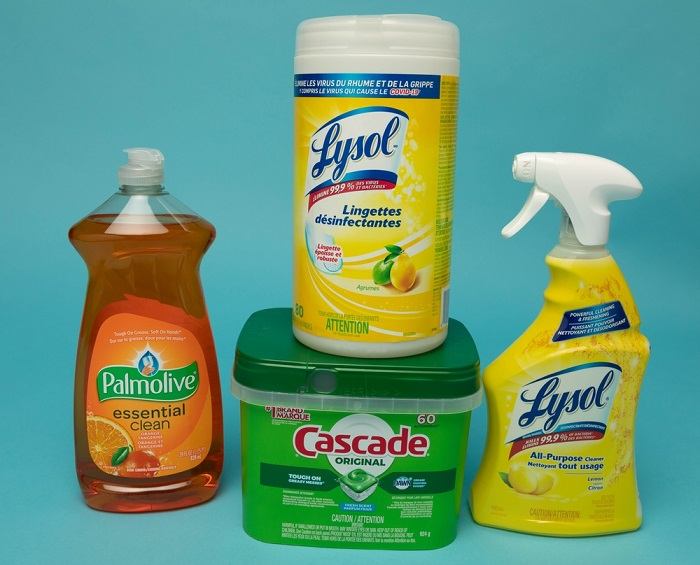
The smells of cleansing merchandise, air fresheners, and soaps are offensive to cats.
Cleansing merchandise, disinfectants, deodorants, air fresheners, and soaps are filled with chemical compounds and overpowering fragrances that the majority cats dislike. Many family merchandise could be toxic to cats by strolling on handled surfaces, adopted by ingestion after grooming. Retailer merchandise safely out of your cat’s attain and preserve the laundry cabinet safe. Contact your vet instantly in the event you consider your feline has ingested any toxin.
Additionally Learn: Insecticide Poisoning In Cats: Signs, Prognosis & Remedy
Why Your Cat’s Sense Of Odor Issues To You
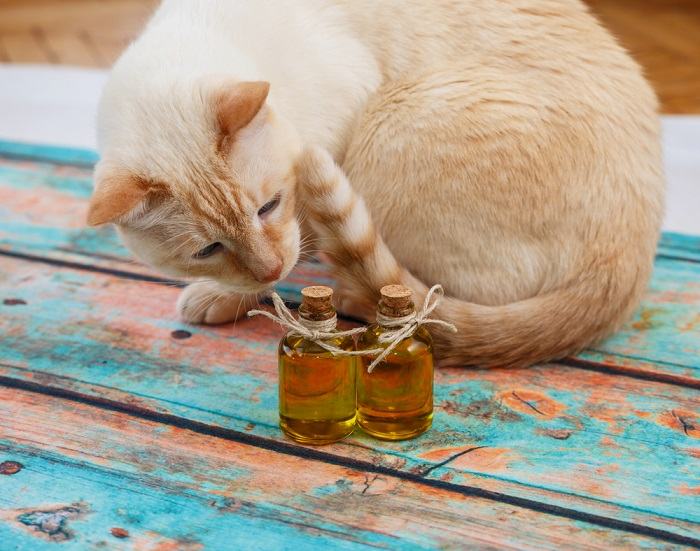
Understanding your cat’s robust sense of odor will show you how to make it possible for your cat’s setting is welcoming and cozy for them.
Cats are extremely explorative animals who use their sense of odor in lots of behaviors. Cats will typically sniff their meals earlier than consumption to make sure its freshness and odor the hand of an individual who’s about to stroke them. They are going to inhale odors of their environment to confirm whether or not the scent is nice or aversive, and of significance or not.
Your cat’s sense of odor issues to you since they prefer it when their dwelling and territory odor the identical. Interference with the sensory notion of their acquainted setting, resembling utilizing scented litter and robust family chemical compounds or furnishings alternative, can repel your kitty from utilizing the litter field and invoke nervousness and misery.
Realizing which scents your cat dislikes may also be useful whenever you need to discourage a cat from accessing undesirable places inside the home and within the yard by scattering small scraps on related surfaces.
Finally, understanding which scents your cat likes or detests can improve your own home setting, assist with behavioral points and enhance their well-being.
Additionally Learn: How To Masks The Cat Odor In Your Residence
What You Can Do About Your Cat’s Sense Of Odor
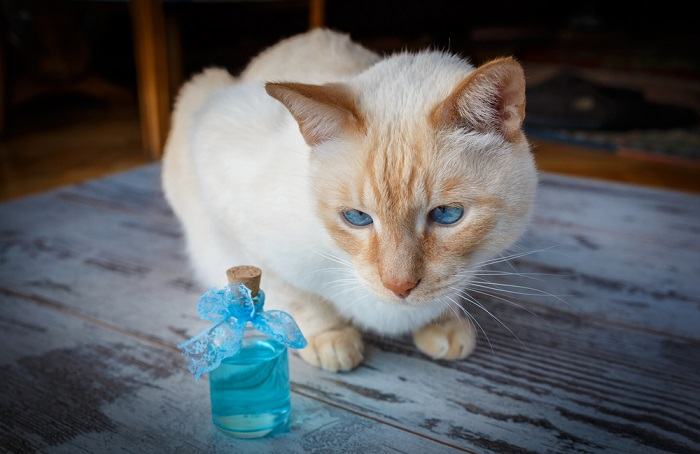
Keep away from utilizing overpowering scents in your house, particularly people who cats sometimes don’t like.
Respect your cat’s sense of odor. Keep away from utilizing potent scent substances like air fresheners, cleansing merchandise, paint, perfumes, and oil and reed diffusers to attenuate disruption of your cat’s dwelling scent map.
Cats use their sense of scent to extend their understanding of security and well-being inside the dwelling. Don’t carry outdoors smells into the home. Depart outside footwear on the entrance door to attenuate disruption to your cat’s sense of safety of its security at dwelling.
Introduce novel gadgets with care. Spray Feliway on new objects earlier than bringing them dwelling to decrease misery.
Additionally Learn: 10 Poisonous & Toxic Crops For Cats
Last Ideas
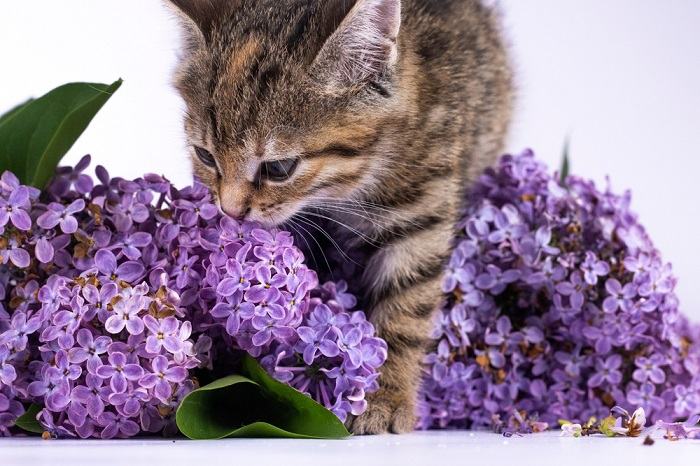
Cats depend on their stellar sense of odor to be able to keep away from one thing that may harm them or make them sick.
Cats are intriguing creatures with a heightened sense of odor. They will consider whether or not a state of affairs, substance, plant, meals, or particular person is protected by means of varied scents and chemical compounds by means of sniffing. A cat’s sense of odor protects them and facilitates survival, so belief your cat’s sniffing powers.
Additionally Learn: 15 Human Meals That Are Toxic & Poisonous To Cats
Continuously Requested Questions
What scents do cats hate essentially the most?
Every cat is a person with likes and dislikes of sure scents. Typically, most cats hate citrus fruits, rotten meals, peppermint, espresso, and vinegar. Explicit cats might also hate the odor of different cats and a few folks.
What scents do cats hate to maintain them from scratching?
Cats hate all citrus scents. In the event you’re making a home made spray, you may make a citrus mist from lemons and orange peels. Place the peels in sizzling water and simmer for 20 minutes. As soon as it’s cool, pressure and pour into a twig bottle.
Alternatively, mix equal elements water and apple cider vinegar. Apply the spray to the inanimate floor to forestall your cat from scratching. Keep away from utilizing important oil, which could be harmful to cats.
What scents do cats hate that can make them cease pooping in an space?
Scents that cats hate embrace pepper, lemon, grapefruit or lime peel, and vinegar. White vinegar is the greenest treatment to discourage cats from pooping in a particular space, because it’s non-toxic, protected, and environment friendly.
Sadly, vinegar alone received’t cease your cat pooping in a single specific space. Seek the advice of your vet or a cat behaviorist to seek out the basis trigger for the conduct and guarantee you could have sufficient litter trays per cat and that your litter field is clear.
About Us web page to study our requirements and meet our veterinary evaluate board.
-
ASPCA. (2022). Poisonous and Non-Poisonous Plant Checklist – Cats. Retrieved October 11, 2022, from ASPCA: https://www.aspca.org/pet-care/animal-poison-control/cats-plant-list
-
Care, I. C. (2020, September 01). Superior Feline Behaviour for Vet Professionals Module 2 Senses and Communication. UK. Retrieved October 13, 2022
-
Sarah L H Ellis, I. R. (2013). AAFP and ISFM Feline Environmental Wants Tips. Journal of Feline Medication and Surgical procedure, 15, 219-230. Retrieved October 12, 2022
[ad_2]